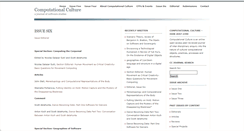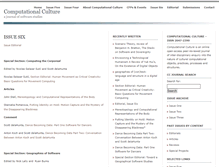Computational Culture
OVERVIEW
COMPUTATIONALCULTURE.NET TRAFFIC
Date Range
Date Range
Date Range
COMPUTATIONALCULTURE.NET HISTORY
WEB PAGE LENGTH OF LIFE
LINKS TO WEBSITE
ACM Conference on Human Factors In Computer Systems. The paper was co-authored with Bill Gaver, Mike Michael, Tobie Kerridge, Andy Boucher, Liliana Ovalle and Matthew Plummer-Fernandez. Call for Contributions for the Launch of.
What do we expect of content moderation? Video gam.
Editorial, Guidelines, Forms. Edited by Armin Beverungen, Florian Sprenger, Susan Ballard.
Editorial, Guidelines, Forms. Issue Edited by Darren Tofts and Christian McCrea. At first I had considered him to be as singular as the phoenix of rhetorical praise; after frequenting his pages a bit, I came to think I could recognize his voice, or his practices, in texts from diverse literatures and periods. I shall record a few of these here. Meme is a weird interne.
Editorial, Guidelines, Forms. Issue Edited by Brett Neilson and Ned Rossiter. Multitudes, Creative Organisation and the Precarious Condition of New Media Labour.
Editorial, Guidelines, Forms. Issue Edited by Andrew Goffey. We do not lack communication. On the contrary, we have too much of it. We lack resistance to the present.
WHAT DOES COMPUTATIONALCULTURE.NET LOOK LIKE?



CONTACTS
COMPUTATIONALCULTURE.NET SERVER
NAME SERVERS
SERVER SOFTWARE AND ENCODING
We revealed that this domain is operating the Apache/2.4.18 (Ubuntu) server.HTML TITLE
Computational CultureDESCRIPTION
CFPs Events. A journal of software studies. Special Section Computing the Corporeal. Edited by Nicolas Salazar Sutil and Scott delaHunta. Nicolas Salazar Sutil, Section Editorial Human Movement as Critical Creativity Basic Questions for Movement Computing. John Stell, Mereotopology and Computational Representations of the Body. Stamatia Portanova, Putting Identity on Hold Motion Capture and the Mystery of the Disappearing Blackness. Scott delaHunta, Dance Becoming Data Part One Software for Dancers.PARSED CONTENT
The web site states the following, "A journal of software studies." I noticed that the web page said " Special Section Computing the Corporeal." They also said " Edited by Nicolas Salazar Sutil and Scott delaHunta. Nicolas Salazar Sutil, Section Editorial Human Movement as Critical Creativity Basic Questions for Movement Computing. John Stell, Mereotopology and Computational Representations of the Body. Stamatia Portanova, Putting Identity on Hold Motion Capture and the Mystery of the Disappearing Blackness. Scott delaHunta, Dance Becoming Data Part One Software for Dancers."ANALYZE SIMILAR WEB SITES
Posted by LEAP CFD Team. On Feb 22, 2018. Posted by LEAP CFD Team. On Nov 28, 2017.
The computational geometric mechanics group at UCSD develops geometric structure-preserving numerical methods using discrete differential geometry, and discrete mechanics techniques. Monday, May 17, 2010. New additions to the Computational Geometric Mechanics group. Over the next few months, we will be welcoming two new postdoctoral scholars, a visiting scholar, and a visiting graduate student to the Computational Geometric Mechanics group at UCSD. Saturday, January 9, 2010.
De-identified data on millions of patients is available for research. Computational Healthcare platform simplifies use of this data while preserving privacy. De-identified data on millions of patients is available for research. Computational Healthcare platform simplifies use of this data while preserving privacy. Conduct more than million studies. Enforce privacy policies on computations. Investigate future visits by similar patients.